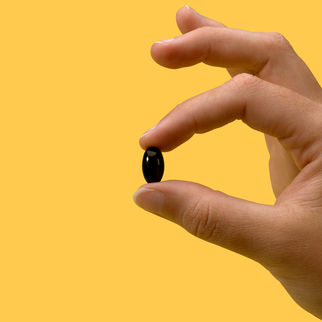It's often said that getting a good night's sleep is crucial for overall health and wellness, but did you know that sleep is also integral to muscle growth and recovery? If you’re still feeling the burn after an intense workout, the secret may be as simple as taking a nap.
Here at iwi life, we’re all about providing you with the help you need to get the most out of your fitness journey. Join us as we discuss the role of sleep on muscle growth and a few other tips that can help you recover from workouts faster.
What Is the Science Behind Sleep?
Sleep is a complex physiological process composed of several stages, including rapid eye movement (REM) sleep and non-REM sleep, which itself is divided into light and deep sleep phases.
Each stage plays a crucial role in the body's ability to recover and regenerate, following the circadian rhythm, our natural internal clock regulating sleep and wake cycles.
Understanding these sleep stages and their functions is essential in appreciating the importance of sleep for muscle growth and recovery.
How Does Sleep Impact Muscle Growth?
Sleep is just as important to your muscle growth as the strength training regimen you’re following. Here are a few reasons why you should prioritize getting quality sleep each night:
Hormonal Balance
Hormones play a crucial role in most daily functions. Your body takes sleep as an opportunity to balance the following hormones:
- Human growth hormone: During the deep sleep stages, the body releases human growth hormone (HGH). The secretion of this hormone plays a pivotal role in stimulating muscle growth and promoting fat loss, essentially laying the groundwork for muscle gains.
- Testosterone: Another hormone integral to muscle building is testosterone, which is produced during sleep. Adequate levels of testosterone contribute to increased muscle mass and strength, as well as improved athletic performance.
- Cortisol: Adequate sleep helps to regulate levels of cortisol, a hormone that, when in excess, can break down muscle tissue. This balance is crucial for muscle repair and growth, highlighting the importance of sleep in maintaining hormonal equilibrium.
Protein Synthesis
When we rest, our bodies are hard at work at the cellular level. Sleep promotes protein synthesis, the process by which the body repairs damaged muscle fibers and creates new ones.
Protein synthesis uses amino acids, the building blocks of protein, to fortify muscle tissues which helps to repair and build muscle (known as hypertrophy) while you sleep.
Energy Restoration
Sleep is a time of restoration and rejuvenation, and this is especially true when it comes to energy stores. During sleep, the body replenishes its glycogen stores, which are essential for providing the energy needed for physical activity and muscle contractions.
Glucose, derived from carbohydrates, is stored in the muscles as glycogen, and during sleep, these stores are filled, ensuring that you have the necessary fuel for your next workout or physical activity.
What Happens When We Don’t Get Enough Sleep?
The repercussions of sleep deprivation extend far beyond mere fatigue and irritability. Lack of adequate sleep significantly affects various aspects of our physical and mental health, influencing everything from cognitive function to metabolic processes.
Effects on Performance
The importance of sleep for athletic performance cannot be understated. A lack of sleep or frequent bouts of poor sleep quality can lead to a reduction in strength, endurance, and aerobic capacity, which are crucial components for optimum athletic performance.
Without sufficient sleep, athletes may find their training sessions to be less effective, and their overall performance may be compromised.
Impaired Recovery
Sleep plays a pivotal role in the muscle recovery process. When we sleep, our bodies undergo various regenerative processes that are crucial for muscle repair and growth.
Adequate sleep ensures the proper functioning of these processes, promoting muscle mass increase and effective recovery from physical exertion. In contrast, sleep deprivation can lead to decreased muscle mass and a compromised recovery process.
Increased Risk of Injury
A lack of sleep both impedes muscle recovery and can increase the risk of injuries. When we’re sleep-deprived, our reaction times may be slower, and our decision-making capabilities can be impaired, making us more prone to accidents and injuries.
Furthermore, the body's ability to repair itself is hampered, making us more susceptible to strains, sprains, and other types of injuries.
How Can You Optimize Sleep for Muscle Growth and Recovery?
The role of sleep in muscle growth and recovery is unequivocal. Ensuring that you get adequate, quality sleep is an essential component of any fitness regimen.
Sleep Hygiene
Practicing good sleep hygiene is a key step in optimizing sleep for muscle growth and recovery.
- Consistent sleep schedule: Maintaining consistent sleep patterns is crucial for regulating the body's internal clock, ensuring that you get the requisite amount of sleep each night.
- Sleep environment: Creating a comfortable, conducive sleep environment is essential. This includes a comfortable mattress and pillows, as well as a cool, dark, and quiet room.
- Reducing screen time before bed: Exposure to screens emits blue light, which can interfere with melatonin production, a hormone that regulates sleep. Limiting screen time before bed can therefore help in achieving better sleep quality.
Nutrition and Sleep
What you eat can significantly impact your sleep duration and quality.
Avoiding stimulants like caffeine and spicy, sugary, or fatty foods can contribute to a better night’s sleep, ensuring that you wake up feeling refreshed and ready to take on the day.
On the other hand, lean proteins, complex carbohydrates, and casein-rich foods can support muscle recovery during sleep. Be sure to add poultry, fish, quinoa, brown rice, cottage cheese, Greek yogurt, and your favorite nuts and seeds to the grocery list.
Can Napping Contribute to Muscle Recovery?
When we think of muscle recovery, we often consider restorative nights of sleep, proper nutrition, and appropriate physical activity. However, the power of napping should not be overlooked.
Napping can be a valuable tool in the muscle recovery process, providing the body with an essential opportunity to rest, repair muscle tissue, and restore energy levels. Short, restful naps can boost the body's ability to repair muscle tissue and restore energy levels, facilitating the recovery process.
Additionally, napping can also improve mood, cognitive function, and overall well-being, all of which can contribute to a more effective and efficient recovery.
What Is the Ideal Nap Length and Timing?
The length and timing of a nap are crucial factors that can influence its effectiveness. A nap lasting between 20 to 30 minutes is typically ideal, as it allows the body to rest and rejuvenate without entering deep sleep, which can leave you feeling groggy and disoriented upon waking.
Timing your nap earlier in the day can also help prevent any potential interference with nighttime sleep.
What Else Can You Do To Promote Muscle Recovery?
In addition to getting enough sleep, there are several other strategies you can employ to enhance muscle recovery, ensure you're ready for your next workout, and minimize the risk of injury.
Healthy Diet
Proper nutrition isn’t just for weight loss, it’s foundational for muscle recovery and growth. A balanced diet that is rich in protein, healthy fats, and carbohydrates provides the essential nutrients your muscles need to repair and rebuild after exercise.
Protein is particularly important as it supplies the amino acids necessary for muscle repair. Foods like chicken, fish, eggs, and dairy are excellent sources of high-quality protein.
Active Recovery
Active recovery involves engaging in low-intensity physical activities such as walking, swimming, or yoga. These activities can help to reduce muscle soreness, improve flexibility, and enhance blood flow to the muscles, facilitating the recovery process.
Proper Hydration
Staying adequately hydrated is critical for muscle function and recovery. Water supports the transportation of nutrients to the muscles and helps to flush out waste products that can contribute to muscle soreness.
Ensure you are drinking enough water throughout the day, especially before, during, and after exercise.
Foam Rolling and Stretching
Incorporating foam rolling and stretching into your recovery routine can help to reduce muscle tightness and improve flexibility. These activities work by releasing tension in the muscles and improving blood flow, which can contribute to a faster and more effective recovery.
Heat and Cold Therapy
Heat and cold therapy can be an effective way to reduce muscle soreness and improve recovery. Heat therapy helps to relax tight muscles and improve blood flow, while cold therapy helps to soothe tension and numb pain.
Alternating between heat and cold therapy can be particularly effective for reducing muscle soreness and facilitating recovery.
Supplements
Supplements can play a crucial role in supporting muscle recovery. iwi life's plant-based omega-3 supplements are derived from sustainable algae sources and provide a potent dose of DHA and EPA.
These essential fatty acids have been shown to soothe tension, support brain health, and promote overall wellness, all of which can contribute to improved muscle recovery.
Our usage of unique algae, including Nannochloropsis, provides a rich source of these essential nutrients, making it an excellent addition to your recovery routine.
The Takeaway
When it comes to muscle growth and recovery, prioritizing sleep is non-negotiable. A good night's rest lasting between seven and nine hours of sleep is foundational to overall health and plays a pivotal role in how your body repairs and builds muscle tissue.
That said, sleep is just one piece of the puzzle. To truly optimize your recovery process and ensure you're in the best shape possible for your next workout or physical activity, consider incorporating iwi life's omega-3 Sport supplements into your post-workout routine.
Our supplements, derived from sustainable algae sources, provide the essential fatty acids your muscles need for optimal recovery and overall wellness. So, don’t just stop at getting enough zzz's; optimize your sleep environment, ensure you're meeting your nutritional needs, and add iwi life’s plant-based omega-3 supplements to your recovery arsenal.
Sources:
Physiology, Sleep Stages | NCBI Bookshelf
Hormones: What They Are, Function & Types | Cleveland Clinic
Testosterone — What It Does And Doesn't Do | Harvard Health
The Regulation of Muscle Mass by Endogenous Glucocorticoids | PMC
Biochemistry, Protein Synthesis | NCBI Bookshelf
Glycogen Metabolism and the Homeostatic Regulation of Sleep | PMC
Sleep Deprivation: What It Is, Symptoms, Treatment & Stages | Cleveland Clinic
How Sleep Affects Athletic Performance | Sleep Foundation
Sleep and Injury Risk | NCBI Bookshelf
Nutrition and Sleep: Diet’s Effect on Sleep | Sleep Foundation
Power Naps: Benefits and How To Do It | Cleveland Clinic
Foam Rolling for Delayed-Onset Muscle Soreness and Recovery of Dynamic Performance Measures | PMC



















